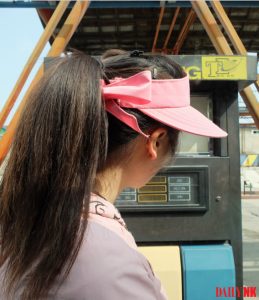The price of refined oil in North Korea has reportedly fallen once again following what appears to be another round of oil imports from China. This suggests that economic cooperation between Pyongyang and Beijing continues to intensify.
According to multiple Daily NK sources in North Korea, the price of gasoline in Pyongyang was KPW 6,800 per kilogram as of Monday. This was about 7% less than what it was a week earlier on July 26. Daily NK also understands that prices are falling in other regions as well, including Sinuiju and Hyesan.
In Hyesan, the recent conspicuous decrease in oil prices contrasts with the middle of last month, when the price of oil fell only slightly following the import of refined oil from China.
The price of gasoline in Hyesan was KPW 6,200 per kilogram and the price of diesel KPW 4,800 a kilogram as of July 29. This was 27% and 9% less, respectively, than they were on July 26.

The authorities appear to have supplied gasoline and diesel to provincial areas immediately after refined oil was imported from China late last month.
With the price of oil falling so much in Hyesan over the course of just three days, there are rumors spreading among locals that the country has taken in “a large quantity of oil” from China.
Some locals also say that North Korean authorities imported gasoline and diesel for the second time in roughly half a month to supply the military, with some of the oil being released into the market.
North Korea likely imported the oil based on some sort of contract with the Chinese. Under such a contract, China likely supplies refined oil to North Korea at prices lower than international market prices in return for North Korean minerals.
Signs that there has been an official restart to Sino-North Korean trade have yet to emerge, however.
In a telephone conversation with Daily NK on Tuesday, a source familiar with the bilateral trade situation said North Korea’s ruling party would decide whether to restart trade “based on the coronavirus situation after October, when primary work on the high-voltage fence along the border will be completed.” He added that the completion of quarantine facilities at Uiju Airfield “does not signify an immediate restart of trade.”

















